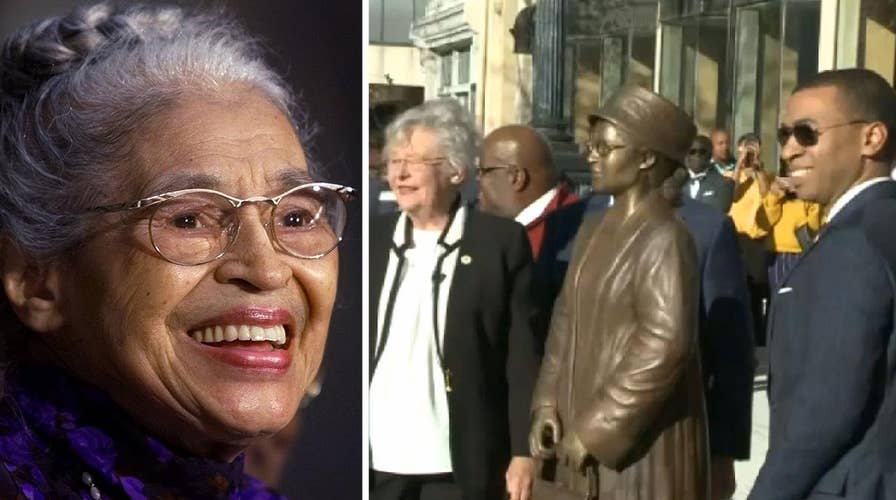Montgomery, Alabama honors civil rights icon Rosa Parks
Sixty-four years after Rosa Parks refused to give up her seat on an Alabama bus, lawmakers unveiled a life-sized bronze statue of the civil rights icon in Montgomery.<br>
Rosa Parks took a historic stand against racial segregation when she refused to give up her bus seat to a white man in Montgomery, Ala. on Dec. 1, 1955.
The "Mother of the Civil Rights Movement" was far from the first person to resist segregation and it wasn't even the first time Parks had a difficult encounter with James F. Blake, the bus driver who had Parks arrested when she refused to give up her seat to a white passenger. But the NAACP and other civil rights leaders were able to use Parks' stand as a catalyst for the Montgomery bus boycott and the larger civil rights movement.
The terror of racism was clear to Parks early in her life, as she grew up on a farm outside Montgomery, Ala. where the Ku Klux Klan conducted night rides.
Parks married Raymond Parks, a member of the NAACP, in 1933. She became a secretary of the NAACP's Montgomery branch in 1943 and managed the office of E.D. Nixon, the president of the chapter through the 1940s and 50s.
BLACK HISTORY MONTH 2021 FOCUSING ON 'THE FAMILY' AS A THEME
Her first confrontation with driver Blake came nearly a decade before the incident that would shape history. With Blake driving, Parks entered the bus and paid her fare. Blake told Parks to exit and reenter through the back doors, which was the norm for Black passengers at the time. When she got off the bus via the front door to walk to the rear, Blake pulled the bus away, leaving Parks at the bus stop.
The two would come face-to-face with history and each other again on Dec. 1, 1955. The 42-year-old Parks was ordered by Blake to move out of her seat on the crowded bus so that a white man could take her spot. Three other Black passengers moved, but Parks stood her ground. She was arrested for disorderly conduct.

The original police report from the Dec. 1, 1955 arrest of Rosa Parks when she refused to give up her bus seat to a white man (National Archives)
Reflecting on the event later, she wrote that she had "been pushed around all my life and felt at this moment I couldn't take it anymore."
"Let us look at Jim Crow for the criminal he is and what he had done to one life multiplied millions of times over these United States and the world," she wrote in a note that is now stored at the Library of Congress.
BLACK LIVES MATTER MOVEMENT NOMINATED FOR NOBEL PEACE PRIZE
Her arrest led to the peaceful Montgomery bus boycott, which lasted 381 days and helped launch then-26-year-old Martin Luther King, Jr. onto the national landscape as a civil rights leader.

This outline of the bus was used during the trial. Parks was convicted under city law, but while her case was being appealed, a district court ruled that bus segregation was unconstitutional. (National Archive)
Parks was convicted in the case but while her appeal made its way through the court system, the U.S. District Court for the Middle District of Alabama ruled on June 4, 1956, that racial segregation of public buses was unconstitutional. The Supreme Court upheld the decision on Nov. 13, 1956.
The Montgomery bus boycott was the first of many protests for racial justice that Parks participated in. She took part in the March on Washington for Jobs and Freedom in 1963 and the famous Selma-to-Montgomery March in 1965 with the late civil rights leader turned member of Congress, John Lewis.
MARTIN LUTHER KING JR.: WHAT TO KNOW ABOUT THE CIVIL RIGHTS LEADER
Parks eventually went to work for the district office of the late Rep. John Conyers, D-Mich., from 1965-1988.

Civil rights activist Kwame Ture, formerly known as Stokely Carmichael, with Rosa Parks (Library of Congress)
After retiring she received the Presidential Medal of Freedom from former President Bill Clinton in 1996 and received the Congressional Gold Medal in 1999.
CLICK HERE TO GET THE FOX NEWS APP
"Rosa Parks said, 'I didn't get on that bus to get arrested. I got on that bus to go home.' In so many ways, Rosa Parks brought America home, to our Founders' dream," Clinton said in 1999 upon presenting Parks with the Congressional Gold Medal.
Parks died in 2005 at the age of 92.











































